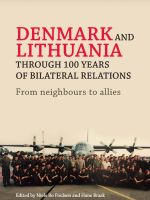Book: The Danish-Lithuanian connection through 100 years
In a new book, a number of Danish and Lithuanian researchers, politicians and diplomats tell the story of the past century’s development of strong diplomatic relations between Denmark and Lithuania. Among other things, the relationship contributed to Lithuania joining NATO and becoming less reliant on Russian oil and gas.
Starting in 1921, Denmark and Lithuania have developed increasingly closer diplomatic ties. In the book, Senior Advisor at DIIS, Kirsten Biering, paints a picture of the first Danish diplomat to arrive in the recently independent country of Lithuania in 1921: Erik Biering. It tells the story of a bankrupt Danish oil magnate from Baku, Azerbaijan becoming the unusual choice for Denmark's envoy to Kaunas, Lithuania. The chapter also sheds light on the Danish Foreign Service's attempts to find its place in a new international order in the aftermath of World War II.
For nearly 50 years, World War II and the subsequent Cold War put a stop to the close cooperation between the two countries. Yet after the collapse of the Soviet Union, Denmark and Lithuania resumed their diplomatic cooperation. Among other things, this cooperation contributed to the achievement of the political-strategic goal of Lithuanian (and Latvian and Estonian) NATO membership, which is arguably one of the greatest defence and security policy achievements for Denmark in recent times.
In the book, Kristian Fischer, Director of DIIS, and Peter Michael Nielsen, Strategic Advisor at the Ministry of Defence, review the development of Danish-Lithuanian defence cooperation after the dissolution of the Soviet Union. They provide a number of new insights into how the cooperation came about and the considerations behind the rekindling of close ties.
After Lithuania became the first Soviet bloc state to declare independence in 1990, it was still burdened by a total dependence on Russian gas and oil. Energy security therefore rose to the top of the country’s national security agenda. In one chapter, senior researcher at DIIS, Trine Villumsen Berling, focuses on the role the Lithuanian energy sector came to play in the struggle for independence.
The chapter tells the story of Denmark's special role in the huge technical transformation that was needed for Lithuania to slowly break free from total dependence on Russian energy. Denmark helped in a number of ways such as with developing Lithuanian legislation, and Danish companies such as Rockwool and Danfoss were involved in renovating draughty houses to save energy.
The book is edited by Hans Brask and Niels Bo Poulsen.
DIIS Experts



